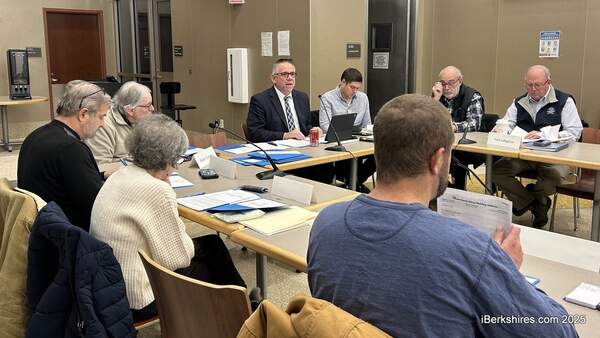
Healthy Steps Announces Hepatitis C Pilot Program
PITTSFIELD, Mass. — Berkshire Health System's harm reduction organization Healthy Steps announced a pilot program for the treatment of Hepatitis C at Tuesday's Board of Health meeting.
Healthy Steps is a harm reduction syringe exchange program out of Berkshire Medical Center that began in 2017. It works primarily with active-injection drug users to discard used needles and provide them with sterile supplies in hopes of preventing the transfer of HIV and Hepatitis C.
The Hepatitis C Pilot Program was developed in June by BMC's Infectious Disease Provider Rachel Picone. Picone started the program because of the struggle that Hep C positive individuals face when trying to obtain treatment, especially when they are current injection-drug users.
The program sees an average of 20 walk-ins a day and tests an average of 50 people a month.
Recently, the program cleared four patients of Hepatitis C. This is a great achievement because its number of cleared patients has been 0 since 2017.
Harm Reduction Supervisor Sarah DeJesus started overseeing this program in March, right at the beginning of the COVID-19 pandemic. DeJesus worked as a harm reduction counselor for Tapestry Health for 15 years.
In the past, many health-care providers required the patient to be abstinent and obtain a referral from a primary-care physician to see a specialist for treatment. This made treatment difficult for recovered drug users who don't have a physician and impossible for active drug users.
This pilot program provides blood work, medication delivery, and appointments in-house through Telehealth, a remote health-care service that can be done from a computer or mobile device.
Patients are not required to stop using for treatment, as Healthy Steps believes that Hep C treatment may empower patients to make better decisions.
“There's a lot of studies that show if people are able to treat their Hep C, they feel empowered, like they are in charge of their own health care,” DeJesus said. "That has a domino effect on their decision-making, health care, and community.”
Because Healthy Steps runs on a walk-in basis, staff are able to become familiar with people in the program and check in with them on a more personal level. Care coordinators will follow up with patients, check in, and remind them of upcoming appointments.
Though, because of COVID-19, it has been more difficult for the program to operate.
“We do like people to come in and check in with us so we know that they are still engaged with some type of care and be able to provide services to them”, DeJesus said. “But balancing that with COVID-19 safety and restrictions can be a hard thing.”
In June, the clinic administered 18 Hep C tests, while in September that number went up to 45. About one third of these tests are positive, as most people are aware of their infection because they have been infected for years but have not had the means to treat it.
DeJesus is also working with Berkshire County House of Corrections to make a program that directly connects Hep C positive patients with Healthy Steps after being discharged. Inmates are not able to get treatment because they lose access to insurance once they are incarcerated.
Almost anyone with an active Hep C infection is eligible for this treatment. Once a person says they are ready for treatment, Healthy Steps does a number of tests a including liver function and complete blood chemistry test. The course of treatment is usually eight-12 weeks and requires taking prescribed medication every day.
Healthy Steps also does testing for syphilis, gonorrhea, and chlamydia as well as providing overdose education and naloxone/Narcan distribution.
Healthy Step's OEND (overdose education and nalaxone distribution) program teaches those at risk for having or witnessing an opioid overdose how to respond and how to obtain the reversion drugs. These individuals are then provided with the life-saving overdose aid in the case that they need to use it.
Healthy Steps also offers testing at facilities such as McGee Recovery Center at BMC, the House of Corrections, Berkshire Clinical Stabilization Services, and sober living homes.
DeJesus said that because they work with a transient population who don't have stable medical care, Healthy Steps winds up providing some primary care and mental health services to clients. This has acted as a gateway to getting these patients into the health system.
“People definitely access health care through us and we help facilitate care that's beyond our scope of what we're able to do in the office," she said.
Healthy Steps has a partnership with AdCare Hospital in Worcester, where AdCare picks up patients from the clinic and brings them directly to treatment.
This year has seen an increase in the number of syringes taken in and out and the amount of Narcan used.
Last year, the program reported that 80 of Healthy Step's Narcans were used for overdoses while the number is currently at 87, already surpassing last year's number.
Healthy Steps is also a community syringe disposal site, so often receives dropoffs from diabetic patients and those who take injection medicine. It has recently increased its public messaging on this topic to encourage more people to safely dispose of their syringes.
DeJesus' hope is that the Hep C pilot is eventually permanently embedded into Healthy Step's program.
Tags: board of health,















